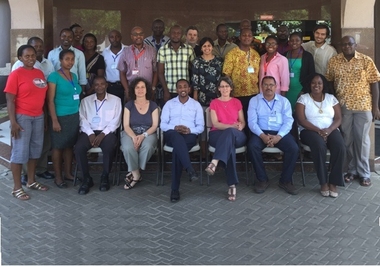- Home
- Engage stakeholders, researchers told
Engage stakeholders, researchers told
Research evidence is just one of evidences that policymakers consider when making decisions. This was said by Dr. DelaKusi-Appouh from Population Council, when she made a presentation on research utilisation at the five-day Adolescent Fertility Analysis Workshop in Accra during the period under review.
Dr. Kusi-Appouh was stressing on the need for researchers to engage stakeholders throughout their research studies and not just think that research evidence by itself will lead to impact.
The workshop included 27 participants from 16 HDSSs, four facilitators, five INDEPTH Secretariat staff and two representatives from Population Council and USAID funded Evidence Project.
“Sometimes researchers’ definition of research evidence is very narrow, she said and reminded the participants that “research is necessary but not sufficient.” Very importantly, she said was the need for researchers to make a thorough analysis of their stakeholders and understand their information requirements.
Talking on data utilisation, INDEPTH Network Policy Engagement and Communications Manager, David Mbulumi, said having data was not enough.
“For data to be understood and actionable we have to change it to actionable information,” he said, adding: “Information is data that has been interpreted so that it has meaning for the user.”
He emphasised the need for researchers and data managers to plan for utilisation before starting research.
“Collecting data is expensive so you need to be very clear about why you need it and how you plan to use it. Plan for utilisation before starting research. Data should also be timely; data that arrives after decisions have been made is of no value,” he said.
During the workshop participants (researchers and data managers) presented data from the various HDSSs represented. Other activities included analyses of various datasets conducted in groups and presentations from Prof. Clementine Rossier University of Geneva and Dr. Valerie Delaunay from Niakhar HDSS in Senegal who gave background on the INDEPTH work on adolescent fertility.
Prof. Bruno Schoumaker from UniversiteCatholique de Louvain, Belgium and Dr. DonatienBeguy from Kenya-based African Population and Health Research Centre (APHRC) led a demonstration discussion on data requirements, while Dr. Aparna Jain from Population Council gave background on the Evidence Project.
Evidence Project is a USAID-funded Council Initiative to improve family planning policies, programmes and practices worldwide.
Welcoming participants on behalf of the Executive Director, INDEPTH Capacity Strengthening & Training Manager, Dr. Martin Bangha reminded participants of workshops organised by the Network to prepare well before they attend and ensure that they carry all the necessary materials required for the various activities during the workshop.
“We had so many centres that had expressed interest but we had to choose a few, so when you come here you have to make the best out of it,” he said, referring to a requirement for the participants to come with datasets for analysis during the five days.
According to Prof. Rossier, the workshop aimed at learning about research on fertility (and adolescent health) conducted at the participating HDSSs, existing data and potential analysis. It also aimed at harmonising the data and conduct comparative analyses.
Other objectives were to prepare drafts manuscripts (1-2 comparative papers) and policy briefs based on the findings and reflect on future analysis plan and possibility of adding some key questions to enrich core data.

